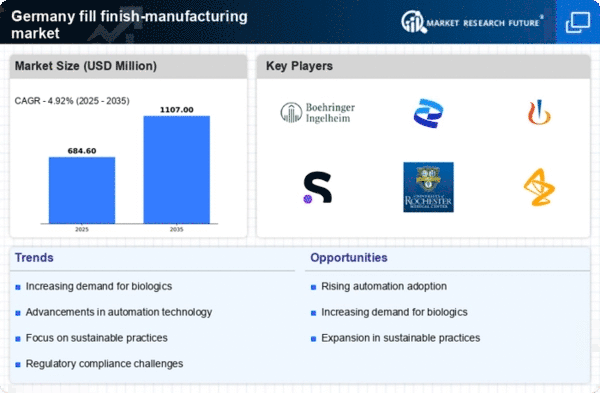Focus on Quality Assurance
Quality assurance remains a critical driver for the fill finish-manufacturing market in Germany. With the increasing complexity of pharmaceutical products, ensuring product integrity and safety has become paramount. Regulatory bodies are imposing stricter guidelines, compelling manufacturers to adopt robust quality management systems. The fill finish-manufacturing market must implement advanced quality control measures, including real-time monitoring and validation processes, to comply with these regulations. This focus on quality not only mitigates risks associated with product recalls but also enhances consumer trust. As a result, companies that prioritize quality assurance are likely to gain a competitive edge in the market.
Emergence of Personalized Medicine
The rise of personalized medicine is reshaping the landscape of the fill finish-manufacturing market in Germany. Tailored therapies require specialized manufacturing processes that can accommodate small batch sizes and unique formulations. This trend is indicative of a broader shift towards individualized healthcare solutions, which is expected to grow at a CAGR of 10% over the next five years. As pharmaceutical companies pivot towards personalized treatments, the fill finish-manufacturing market must adapt its capabilities to support these innovations. This may involve the development of flexible manufacturing systems that can efficiently handle diverse product specifications, thereby enhancing the overall responsiveness of the industry.
Rising Demand for Biopharmaceuticals
The increasing demand for biopharmaceuticals in Germany is a pivotal driver for the fill finish-manufacturing market. As the healthcare sector evolves, the need for advanced therapies, including monoclonal antibodies and gene therapies, has surged. This trend is reflected in the projected growth of the biopharmaceutical market, which is expected to reach €40 billion by 2026. Consequently, fill finish-manufacturing processes must adapt to accommodate the unique requirements of these products, such as stringent sterility and stability standards. The fill finish-manufacturing market is thus positioned to benefit from this rising demand, necessitating investments in state-of-the-art facilities and technologies to ensure compliance with regulatory standards and to meet the growing production needs.
Investment in Automation and Robotics
The fill finish-manufacturing market in Germany is experiencing a significant shift towards automation and robotics. This transition is driven by the need for increased efficiency, reduced labor costs, and enhanced precision in manufacturing processes. Automation technologies, such as robotic filling systems, are being integrated into production lines to minimize human error and improve throughput. Reports indicate that automation can lead to a reduction in operational costs by up to 30%. As manufacturers seek to optimize their operations, the fill finish-manufacturing market is likely to see a surge in investments in automated solutions, which will ultimately enhance productivity and product quality.
Sustainability and Environmental Regulations
Sustainability is becoming an increasingly important driver for the fill finish-manufacturing market in Germany. As environmental regulations tighten, manufacturers are compelled to adopt sustainable practices throughout their operations. This includes minimizing waste, reducing energy consumption, and utilizing eco-friendly materials. The German government has set ambitious targets for reducing carbon emissions, which directly impacts the fill finish-manufacturing market. Companies that proactively implement sustainable practices may not only comply with regulations but also appeal to environmentally conscious consumers. This shift towards sustainability is likely to influence investment decisions and operational strategies within the industry.
















